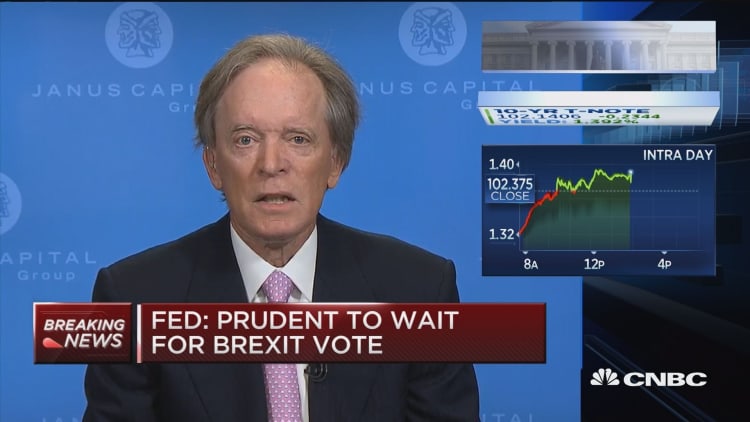
The Federal Reserve's communication practices are confusing investors, noted bond investor Bill Gross said Wednesday.
The Federal Reserve Open Market Committee on Wednesday released minutes from its June meeting, which showed policymakers decided to hold off hiking interest rates until they had a handle on the implications of the Brexit vote.
Several participants also expressed concerns about the committee's communications and whether it was being fully effective in informing the public.
Gross agreed.
"Investors become confused when they look at the green dots as high as they are and hear from others that suggest reliance on old standard models," the manager of the Janus Global Unconstrained Bond Fund said on CNBC's "Power Lunch."
"I think ultimately what the Fed really wants to do is keep the interest rate low and perhaps keep curve as positive as possible, because 10-year rates and 30-year rates at these levels are not conducive for economic health for many financial institutions like banks and insurance companies."
In a note to investors Wednesday, Gross said the contribution of money velocity to GDP growth is coming to an end and may even be creating negative growth thanks to yields that are near zero and negative.
"Our credit-based financial system is sputtering, and risk assets are reflecting that reality even if most players (including central banks) have little clue as to how the game is played," he said in his latest Investment Outlook.
Combined, the Federal Reserve, Bank of Japan and European Central Bank have created $12 trillion of quantitative easing, Gross told "Power Lunch."
"Theoretically, that should be enough money to provide prosperity across the globe. It hasn't taken," he said.
That's because for one, the private sector has been subject to regulation. Also, many borrowers don't want to borrow despite low interest rates and many banks don't want to lend based upon the perceived risks of the economy going forward, he explained.
That also means that investors should now worry about recouping their money.
"When money is so overpriced, when interest rates so low and negative, when stocks … are artificially high, then it is time to worry about the return of your money as opposed to the return on your money."
— Reuters contributed to this report.


